|
|
|
Sort Order |
|
|
|
Items / Page
|
|
|
|
|
|
|
| Srl | Item |
| 1 |
ID:
138088
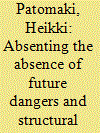

|
|
|
|
|
| Summary/Abstract |
One of the great appeals of securitization theory, and a major reason for its success, has been its usefulness as a tool for empirical research: an analytic framework capable of practical application. However, the development of securitization has raised several criticisms, the most important of which concern the nature of securitization theory. In fact, the appropriate methods, the research puzzles and type of evidence accepted all derive to a great extent from the kind of theory scholars bequeath their faith to. This Forum addresses the following questions: What type of theory (if any) is securitization? How many kinds of theories of securitization do we have? How can the differences between theories of securitization be drawn? What is the status of exceptionalism within securitization theories, and what difference does it make to their understandings of the relationship between security and politics? Finally, if securitization commands that leaders act now before it is too late, what status has temporality therein? Is temporality enabling securitization to absorb risk analysis or does it expose its inherent theoretical limits?
|
|
|
|
|
|
|
|
|
|
|
|
|
|
|
|
| 2 |
ID:
138085
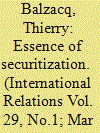

|
|
|
|
|
| Summary/Abstract |
One of the great appeals of securitization theory, and a major reason for its success, has been its usefulness as a tool for empirical research: an analytic framework capable of practical application. However, the development of securitization has raised several criticisms, the most important of which concern the nature of securitization theory. In fact, the appropriate methods, the research puzzles and type of evidence accepted all derive to a great extent from the kind of theory scholars bequeath their faith to. This Forum addresses the following questions: What type of theory (if any) is securitization? How many kinds of theories of securitization do we have? How can the differences between theories of securitization be drawn? What is the status of exceptionalism within securitization theories, and what difference does it make to their understandings of the relationship between security and politics? Finally, if securitization commands that leaders act now before it is too late, what status has temporality therein? Is temporality enabling securitization to absorb risk analysis or does it expose its inherent theoretical limits?
|
|
|
|
|
|
|
|
|
|
|
|
|
|
|
|
| 3 |
ID:
112767


|
|
|
|
|
| Publication |
2012.
|
| Summary/Abstract |
This article presents an introduction to the special volume, titled The European Union (EU) and the Security Sector Reform Practices: Challenges of Implementation, by framing the debate on the EU's Security Sector Reform (SSR) activities in a variety of conflict and post-conflict settings. Drawing on the existing body of literature on SSR, the analytical model proposed here allows us to identify, categorize, and group a wide range of factors that are relevant for understanding the performance of the EU as an SSR actor. This article introduces the main themes of this special issue, summarizes each individual contribution briefly, extends the main research findings of this special issue, and concludes with broad commonalities across different cases. It is a conceptual article outlining a discussion of wider theoretical reflections based on the empirical contributions presented in this volume, and provides an explanatory framework for success or failure in the individual case studies that follow.
|
|
|
|
|
|
|
|
|
|
|
|
|
|
|
|
| 4 |
ID:
152029
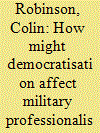

|
|
|
|
|
| Summary/Abstract |
The search continues for methods to improve security for development in Sub-Saharan Africa. One of the important actors in this security arena is Sub-Saharan African governments’ armies. Much of their capability to meet security challenge depends on how militarily professional they are. The wave of democratic evolution in Africa since 1990 also affected military professionalism. This article reviews three models for assessing how democratisation might affect military professionalism in Sub-Saharan Africa, with special attention to post-conflict states. This should make it possible to decide which analytical methods are most appropriate to measure military professionalism in the particular circumstances of Sub-Saharan African post-conflict democratisation. Depending upon the particular nation-state in question, this decision on analytical methods may be useful for other Sub-Saharan states as well.
|
|
|
|
|
|
|
|
|
|
|
|
|
|
|
|
| 5 |
ID:
138084
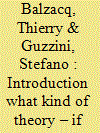

|
|
|
|
|
| Summary/Abstract |
One of the great appeals of securitization theory, and a major reason for its success, has been its usefulness as a tool for empirical research: an analytic framework capable of practical application. However, the development of securitization has raised several criticisms, the most important of which concern the nature of securitization theory. In fact, the appropriate methods, the research puzzles and type of evidence accepted all derive to a great extent from the kind of theory scholars bequeath their faith to. This Forum addresses the following questions: What type of theory (if any) is securitization? How many kinds of theories of securitization do we have? How can the differences between theories of securitization be drawn? What is the status of exceptionalism within securitization theories, and what difference does it make to their understandings of the relationship between security and politics? Finally, if securitization commands that leaders act now before it is too late, what status has temporality therein? Is temporality enabling securitization to absorb risk analysis or does it expose its inherent theoretical limits?
|
|
|
|
|
|
|
|
|
|
|
|
|
|
|
|
| 6 |
ID:
138086
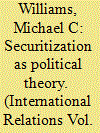

|
|
|
|
|
| Summary/Abstract |
One of the great appeals of securitization theory, and a major reason for its success, has been its usefulness as a tool for empirical research: an analytic framework capable of practical application. However, the development of securitization has raised several criticisms, the most important of which concern the nature of securitization theory. In fact, the appropriate methods, the research puzzles and type of evidence accepted all derive to a great extent from the kind of theory scholars bequeath their faith to. This Forum addresses the following questions: What type of theory (if any) is securitization? How many kinds of theories of securitization do we have? How can the differences between theories of securitization be drawn? What is the status of exceptionalism within securitization theories, and what difference does it make to their understandings of the relationship between security and politics? Finally, if securitization commands that leaders act now before it is too late, what status has temporality therein? Is temporality enabling securitization to absorb risk analysis or does it expose its inherent theoretical limits?
|
|
|
|
|
|
|
|
|
|
|
|
|
|
|
|
| 7 |
ID:
138087
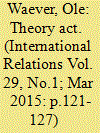

|
|
|
|
|
| Summary/Abstract |
One of the great appeals of securitization theory, and a major reason for its success, has been its usefulness as a tool for empirical research: an analytic framework capable of practical application. However, the development of securitization has raised several criticisms, the most important of which concern the nature of securitization theory. In fact, the appropriate methods, the research puzzles and type of evidence accepted all derive to a great extent from the kind of theory scholars bequeath their faith to. This Forum addresses the following questions: What type of theory (if any) is securitization? How many kinds of theories of securitization do we have? How can the differences between theories of securitization be drawn? What is the status of exceptionalism within securitization theories, and what difference does it make to their understandings of the relationship between security and politics? Finally, if securitization commands that leaders act now before it is too late, what status has temporality therein? Is temporality enabling securitization to absorb risk analysis or does it expose its inherent theoretical limits?
|
|
|
|
|
|
|
|
|
|
|
|
|
|
|
|
| 8 |
ID:
135841
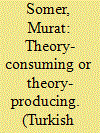

|
|
|
|
|
| Summary/Abstract |
Case studies of Turkey are typically read and cited as narratives of the Turkish case itself, suppliers of case-specific data, or at best, applications of more general theories. They are not perceived as theory-testing, producing, or even informing exercises. While this tendency partly results from the institutional, geographical–cultural, and methodological biases of extant social sciences, scholars may also be to blame for neglecting theory-development or for producing descriptive narratives. How can Turkish Studies scholars successfully contribute to general theory-development in their respective disciplines? The main value of Turkey for producing theory may lie in its rare combination of many qualities and in its temporal and regional variations. Thus, this article argues that, besides small-N and large-N comparative studies, the most promising way Turkish Studies can engage in theory-building may be by examining Turkey as a theory-developing critical case, i.e. as a crucial or, pathway or within-unit comparative case. For this, scholars would carefully design their studies as theory-infirming, theory-confirming, or theory-producing crucial case studies, utilize temporal and cross-sectional comparisons, and pay special attention to causal mechanisms, sequences, and processes. By using evidence from publications that draw on the Turkish case, the article shows that, since the 1990s, scholars have produced more research published in highly ranked journals of comparative politics, international relations and area studies. They also generate more single case studies with general theoretical ambitions and more visibility but so far with unclear actual theoretical impact. The article discusses some qualities of Turkey which make it a promising critical case for theory-development and how studying it this way can also help to achieve a better understanding of Turkey itself.
|
|
|
|
|
|
|
|
|
|
|
|
|
|
|
|
|
|
|
|
|